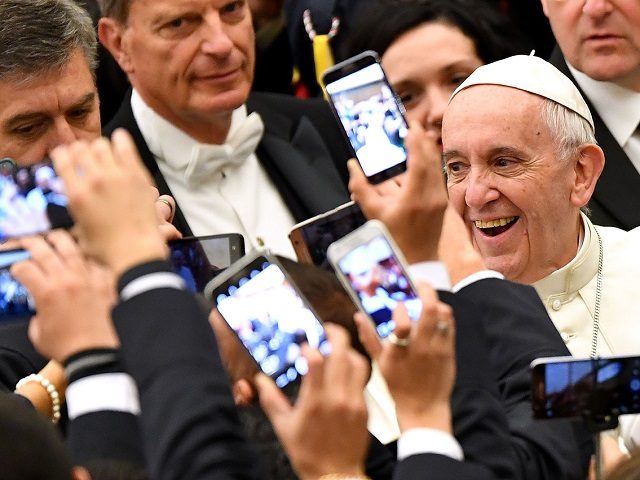In a powerful address to journalists over the weekend, Pope Francis defended the principle of freedom of the press, while calling on journalists to avoid the “sins” of fake news and sensationalism.
In a meeting with representatives of Italian news media in the Vatican Saturday, the Pope said that journalists have “one of the most important” missions in today’s world: to inform correctly and “offer everyone a version of the facts as close as possible to reality.”
Vibrant and free news media are essential “for the growth of any society that wants to call itself democratic,” Francis insisted, “to assure a continuous exchange of ideas and a fruitful debate based on real and correctly reported information.”
The pontiff also called for “the defense of a genuine pluralism” to make sure that all sides of a story receive the attention they deserve.
Society requires “a scrupulous respect for the right to information,” the Pope said, while also denouncing irresponsible hit pieces aimed at discrediting one’s enemies.
Francis listed what he called three “sins of communication,” namely disinformation, slander and defamation, calling them “very grave sins” that harm both the one who commits them and the one targeted. These include one-sided and sensationalist journalism as well as “digging up old things that have been left in the past and bringing them to light today.”
Modern media are often governed by a push for immediate news and sensationalism at the expense of precision and completeness, the Pope said, and can replace thoughtful reflection with overheated, fabricated emotion.
In this context, “there is a pressing need for reliable information, with verified data and news,” which help readers develop a healthy critical sense while allowing them to ask the right questions, he said.
The Pope condemned attempts by certain media to “manipulate reality, opinions and people,” which result in useless “mediatic dust-ups.”
Journalists are called to make complex problems accessible to a vast audience, he said, digesting information available to the specialists and articulating it for a broader public.
The pontiff also urged serenity, precision, completeness, and sober language in news reporting, saying that these tools foster fruitful reflection, while tendentious and ambiguous speech do the opposite.
“It is important to patiently and methodically offer criteria of judgment and information to the public,” he said, “to allow for understanding and discernment, rather than confusion and disorientation.”
Civil society and its institutions should do everything in their power to allow the media “to carry out their irreplaceable task, in the defense of a genuine pluralism,” he said.
This is not the first time the Pope has denounced “fake news,” and famously compared it to excrement in December 2016.
Not long after the release of a 2005 video of Donald Trump in which he made offensive comments regarding women, Pope Francis made an allusion to a very similar hypothetical case where media gleefully bring out people’s past indiscretions.
The temptation occurs, Francis said, when a person “perhaps in his past life, or ten years ago, had a problem with the law, or a problem in his family life,” but he has already paid for it, “in which case, to bring this to light today is serious, and can harm or even destroy a person,” he said.
The Pope also criticized the media’s tendency to present only one side of a story, which he qualified as “disinformation, that is, to tell only part of the truth of a situation and not the other.”
This disinformation, he said, keeps people from making a “serious judgment” and therefore is “probably the greatest harm they can do, because it sways views in one direction, leaving out the other part of the truth.”
Follow Thomas D. Williams on Twitter Follow @tdwilliamsrome

COMMENTS
Please let us know if you're having issues with commenting.